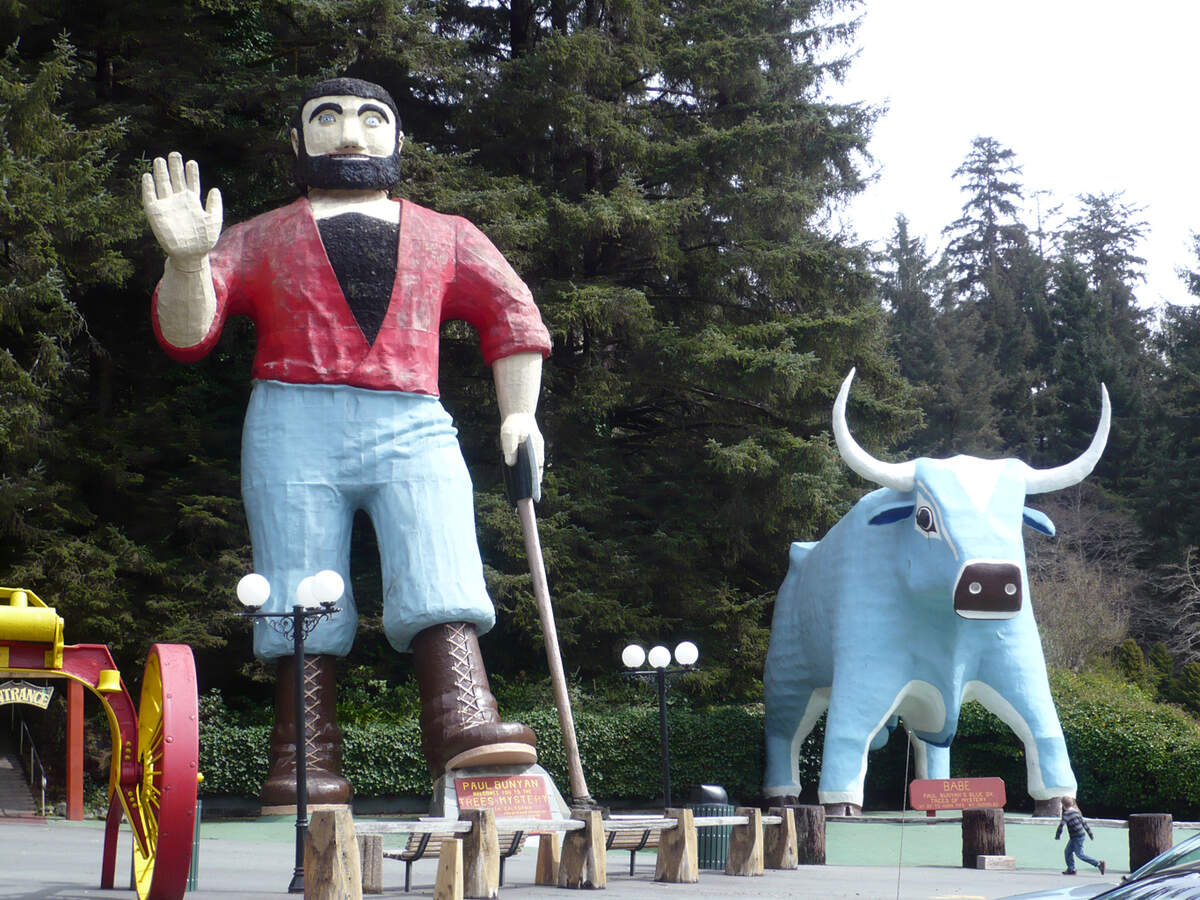

Paul Bunyan Day
Observed
annually on February 12th
Dates
Hashtags
Sources
https://blog.library.si.edu/blog/2011/06/28/paul-bunyan-day/#.XtLMDuzYrrchttps://history.howstuffworks.com/history-vs-myth/real-paul-bunyan.htm
https://www.bemidjipioneer.com/news/4466340-legendary-lumberjack-national-paul-bunyan-day-celebrates-bemidjis-most-iconic-resident
https://www.brownielocks.com/PaulBunyanDayTrivia.html
https://www.facebook.com/MainePublic/photos/a.187488502032/10158301699527033/?type=3
https://www.farmersalmanac.com/paul-bunyan-20324
https://www.history.com/news/was-paul-bunyan-a-real-person
https://www.holidayinsights.com/moreholidays/June/paulbunyanday.htm
North American folklore is replete with stories of larger-than-life figures, but none of them stands taller than the giant lumberjack Paul Bunyan, who is said to have traveled around the continent with Babe, his big blue ox. Many cities and states across the United States pay tribute to Bunyan, some have put up statues of him, and some also claim him to be their native son. Some areas where Bunyan is prominently featured include Bemidji, Brainerd, and Akeley, in Minnesota; Bangor, Maine; and locations in Iowa, Wisconsin, Michigan, and California. On Paul Bunyan Day, his legend is not only celebrated in these locations but all around the world.
Today's observance is particularly tied to Bangor, Maine. Residents claim Bunyan was born in the woods outside of the city on February 12, 1834. Coincidentally, this is also the date that Bangor was incorporated. A 31-foot statue of Bunyan stands in front of the Cross Insurance Center on Main Street. It was gifted to the city by the New York-based model-making company Messmore & Damon on the occasion of the 125th birthday of Bunyan and the city. A time capsule is enshrined within it which will be opened 125 years after it was placed there, on February 12, 2084.
Throughout history, the story of Paul Bunyan has changed and grown until becoming what it is today. One account says that Bunyan was based on Fabian "Joe" Fournier, a French-Canadian logger who moved to Michigan after the American Civil War. Known as Saginaw Joe, he was strongly built, had giant hands, and was six feet in height. Rumor has it that he also had two sets of teeth. It is believed that he died in 1875 after being hit in the back of the head with a mallet during a fight in Bay City, Michigan. After his death and the trial of his alleged killer, stories about him started turning into tales.
At some point, the story of Fournier combined with that of Bon Jean, a French-Canadian war hero, and the story of Bunyan was further solidified. Bon Jean had played a role in the Papineau Rebellion in Canada in 1837. Bunyan's name also comes from Bon Jean. Stories of Paul Bunyan, which were full of hyperbole and exaggerations, proliferated by word of mouth, being passed from generation to generation in logging communities and amongst lumberjacks in the United States and Canada.
Written stories about Bunyan started appearing in the early twentieth century. One of the first stories to appear in print, titled "Round River," was written by James MacGillivray and was printed in a local newspaper in Oscoda, Michigan, in 1906. Four years later, MacGillivray shared a collection of stories about Bunyan when working at the Detroit News Tribune. Bunyan got his first national print exposure in 1912 when MacGillivray and a poet collaborated to create a poem for Lumberman magazine that was inspired by the lumberjack.
In 1914, William Laughead—a logger and advertising manager of the Red River Lumber Company—depicted Bunyan in his company's advertising pamphlets. This was the first time Bunyan was depicted in illustrations, and they helped to spread his story across the United States. Laughead's illustrations also showcased Babe the blue ox and gave her her name.
There are many legends surrounding Bunyan. It is said that he started the logging profession in the United States and that he hired large men who cleared large forests across the continent with him and Babe. It is said that his and Babe's footprints created Minnesota's 10,000 lakes, that he created the Great Lakes so Babe had a place to drink, that he formed the Grand Canyon by dragging his axe, that he made Mount Hood by piling up stones to extinguish a campfire, that he cleared all of South and North Dakota for farming, and that he was able to eat 50 pancakes a minute. These are all quite impressive feats. Today we celebrate the giant lumberjack behind them.
How to Observe Paul Bunyan Day
Celebrate all things Paul Bunyan today. Here are some ideas to get you started:
- Visit one of the many Paul Bunyan statues. Some locations where you can find statues include Portland, Bangor, Bemidji, Brainerd, Akeley, Klamath, and Cheshire. It would be especially appropriate to visit the statue in Bangor today, on the anniversary of the city's founding and the date on which they claim Paul Bunyan was born. See if there are any Paul Bunyan Day celebrations taking place in Bangor or in any other city.
- Ride Paul Bunyan's Log Chute in the Mall of America.
- Visit the Paul Bunyan Logging Camp Museum in Eau Claire.
- Make and eat some flapjacks.
- Make a pilgrimage to Paul Bunyan's Cook Shanty in Wisconsin Dells or Minocqua.
- Watch the 1958 short film Paul Bunyan, the 1995 film Tale Tale, or the 2017 animated film Bunyan & Babe.
- Tell stories around a campfire.
- Read books and stories about Paul Bunyan. Some examples include The Marvelous Exploits of Paul Bunyan by William Laughead, Paul Bunyan Swings His Axe by Dell J. McCormick, and Paul Bunyan by Esther Shephard.





















